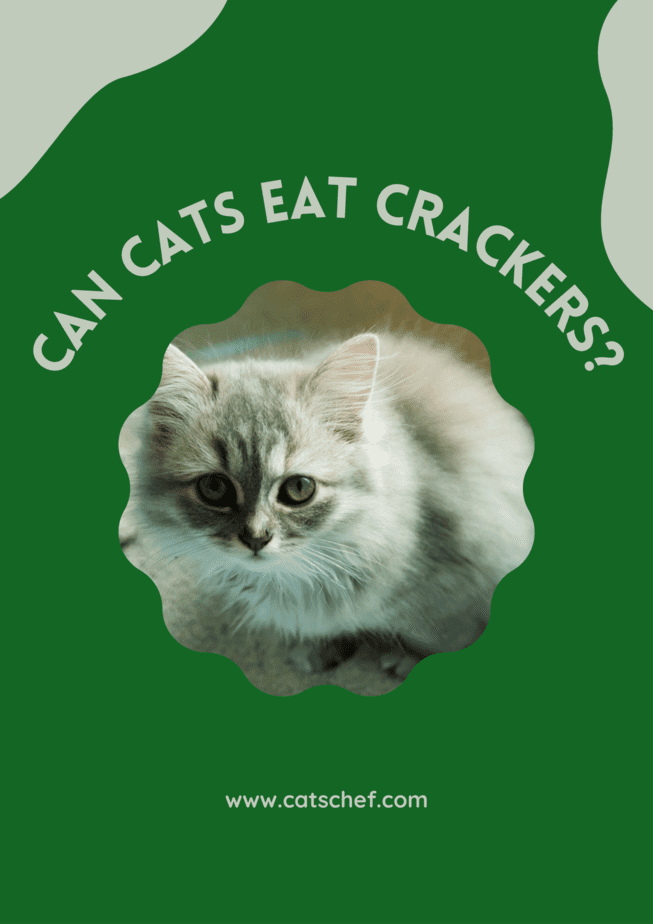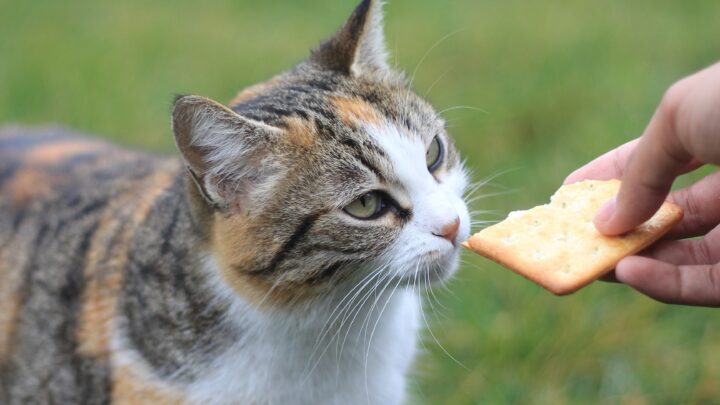Who doesn’t love a crunchy cracker topped with delicious cream cheese, figs, and honey? If there was ever a snack that made you feel bad and boujee, it would be this one. The only thing that would make this experience better would be sharing it with your favorite pet. Can cats even eat crackers!?
You can’t speak for anyone else, but your cat loves munching on anything she sees on your plate. She’s also a huge fan of crunchy snacks and crackers seem to check all the boxes for her. Graham crackers, Ritz crackers, saltine crackers – your purrincess doesn’t discriminate. After all, she got it from her momma!
You shouldn’t be surprised if your mischievous monster gets a little too excited every time you whip out a bag of these savory tidbits. If you’re planning on letting her take a bite or two, you should probably check the ingredients list first.
Crackers are usually made with flour, yeast, salt, and oil. Depending on the brand, you might also be dealing with heaps of cheese and flavorsome herbs. These ingredients might make crackers irresistible to your taste buds, but your kitto’s digestive system might not agree.
So, can cats eat crackers? Technically yes, but generally no. While crackers aren’t toxic to cats, they do contain a lot of ingredients that might lead to digestive issues in the long run. Feel free to share a cracker or two with your favorite pet, but don’t make them a regular part of her diet.
Why are crackers bad for your cat?
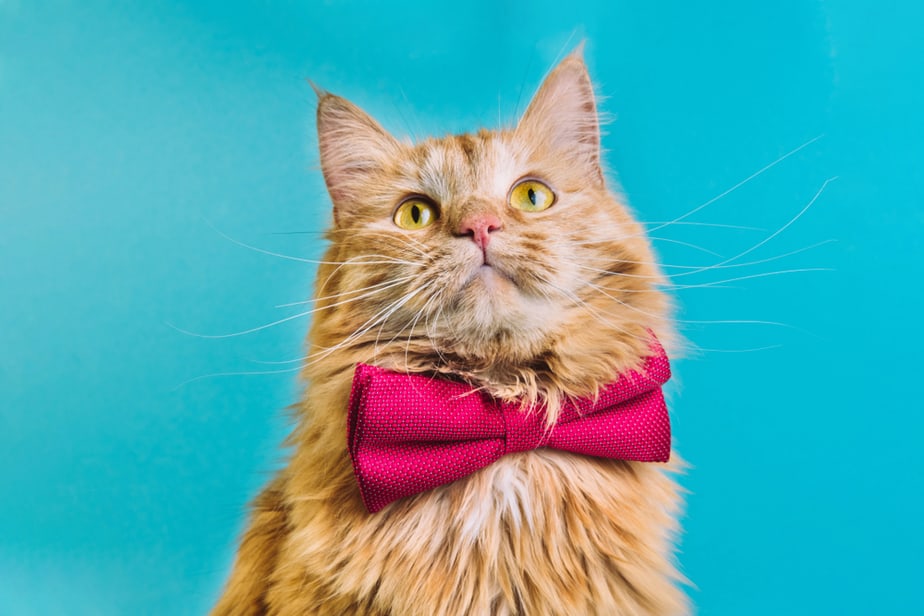
Crackers seem completely harmless if you think about all the gross things your boisterous beast puts in her mouth when you’re not looking. But that’s just another reason you should put more thought into her regular diet.
Crackers aren’t toxic to your cat, but they’re also not the best choice for a well-deserved treat. They carry little to no nutritional value, and they come with the risk of one of their ingredients causing digestive issues, or worse. Luckily for you, you don’t have to rely on them!
There are plenty of healthy alternatives on the market, and your precious pet would be better off munching on those in her free time. If you’re adamant about sharing everything you eat with your cat, you might want to look into making crackers from scratch.
In the meantime, here are a couple of reasons you should give sharing these delicious crunchy morsels with your shameless shadow another thought. Cats can eat crackers, but at what cost?
1. They’re too salty
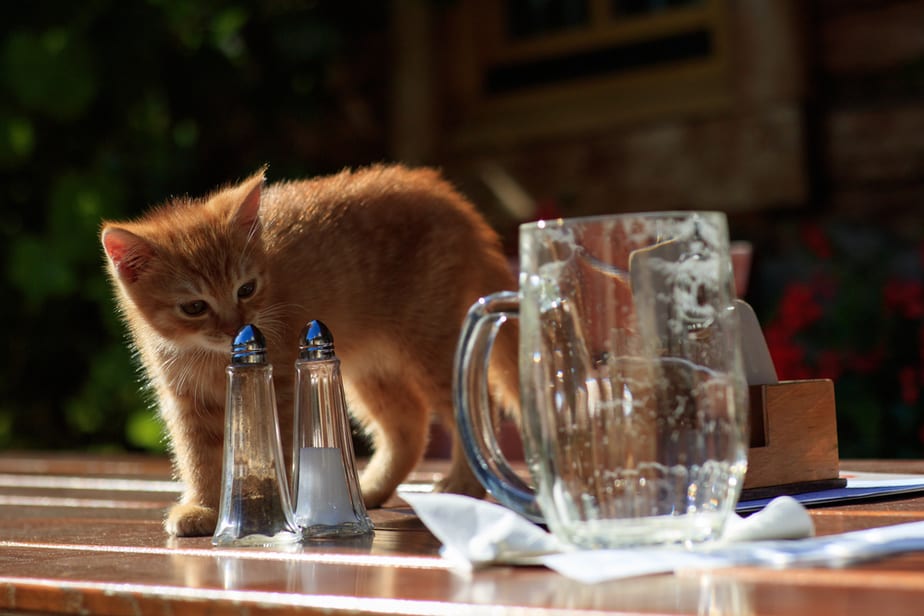
Can cats eat crackers?
A regular cracker contains about 29 milligrams of salt. A sea salt cracker racks up an astounding amount of 109 milligrams of salt. An average cat can only consume up to 40 milligrams of salt a day, and most of its sodium consumption comes from its regular meat-based diet.
Now that’s some food for thought!
Crackers simply don’t belong in your precious pet’s body. A high sodium diet can lead to numerous gastrointestinal diseases, feline obesity, or even death. Eating a crumb or two of these savory tidbits probably won’t cause any harm, but it’s better to be safe than sorry!
If you’re thinking of sharing a cracker or two with your cat, you might want to look into common dehydration symptoms. Contrary to the popular belief, eating salty treats won’t encourage your purrincess to drink more water. She might even develop liver and kidney problems!
Not only that, high levels of salt can form crystals in your cat’s bladder. This condition is far worse than it sounds as it can stop your poor pet from urinating. Blockages of the bladder can become extremely uncomfortable and painful.
And we can’t forget about salt poisoning! While it has been proven that high sodium levels aren’t as harmful to cats as we previously believed, they can still lead to salt poisoning. You should keep an eye out for symptoms of lethargy, diarrhea, and vomiting.
2. They’re too fatty
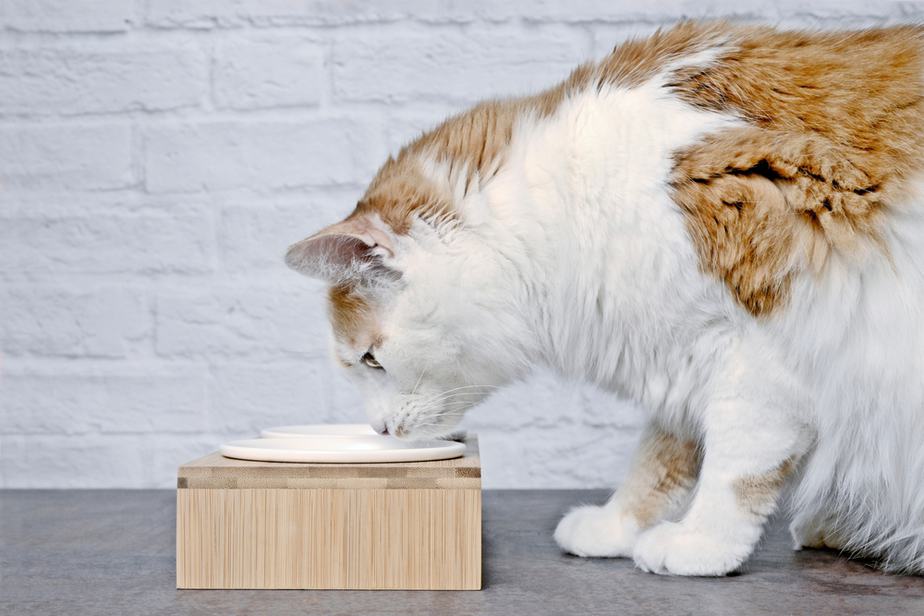
Can cats eat crackers? Believe it or not, these crunchy morsels are way too fatty for your greedy glutton. It may come as a surprise to you that a single cracker can contain up to 5 grams of fat, depending on the kind.
High levels of fat can lead to various digestive issues, and more importantly, to feline obesity. Unfortunately, cats are prone to becoming overweight and obese, especially if their parents think they’re adorable when chunky. (I’m looking at you!)
Your precious purrincess might look incredibly cute when she’s lying on the floor and her belly turns into a giant pancake, but… Feline obesity shouldn’t be taken lightly. Once you allow your cat to get to that stage, you’ll face a lot of difficulties trying to get her to lose weight.
It goes without saying that an odd Ritz or Graham cracker won’t make much difference, but if your furbaby’s a huge fan of crunchy treats, you might have a hard time saying no to her. It’s best to avoid crackers altogether and make a switch to healthier options.
3. They’re too cheesy
Many crackers owe their mouth-watering flavor to this universally loved dairy product! Since most felines are lactose intolerant, you might want to check the label and look for cheese before purchasing your next box of delicious snacks. Sadly, that means no Ritz crackers for your cat!
If your mischievous monster eats too many cheesy crackers, she might experience some severely uncomfortable digestive issues. While cheese isn’t toxic to cats, its consumption can lead to an upset stomach, diarrhea, and vomiting.
It goes without saying, but if you notice any of these symptoms, you should contact your vet immediately. Your cat’s body isn’t able to produce enough enzymes that digest dairy properly. This means she might need medical help if she eats too many crackers. Who knew Ritz crackers could be so dangerous!?
You shouldn’t be disappointed to find out you can’t share your favorite cheesy snack with your precious pet. Your cat’s diet should consist of fresh animal meat or commercially available feed. An occasional cracker or two won’t cause any harm, but it’s better to err on the safe side.
4. They’re too spicy
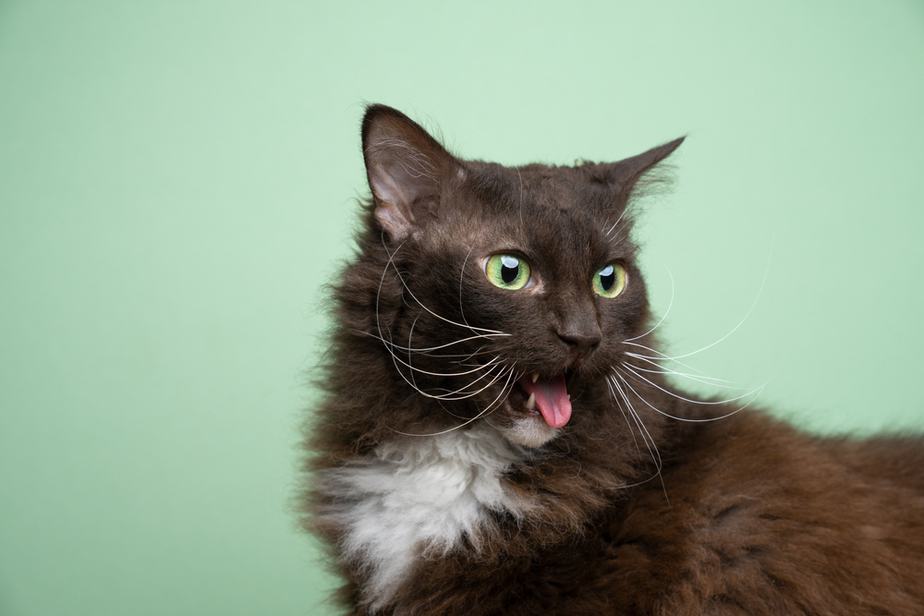
Have you ever seen that ”Why is it spicy” TikTok meme? That would be your cat’s reaction to any cracker that contains onion or garlic.
Unfortunately, herbs and spices can be pretty problematic to your precious pet. Onion, garlic, chives, or oregano shouldn’t be a part of your cat’s diet.
Regular crackers don’t contain these spices, but you can definitely find different varieties on the market. If you’re planning on sharing these delicious crunchy morsels with your cat, you should avoid purchasing the Ritz garlic and butter crackers, or Tesco garlic and chives crackers.
Onion, garlic, and chives are members of the Allium plant family. These aromatic plants contain an enzyme that enters your cat’s bloodstream and ruptures her red blood cells. Ingesting any amount of garlic or other onion-family foods can lead to various types of feline anemia.
Oregano is one of the many herbs that are considered toxic to your feline friend. Fresh and dried oregano leaves include chemicals such as flavones and polyphenols, which can lead to serious digestive issues if consumed in excessive amounts.
It’s safe to say that you need to be careful when choosing the right brand of crackers. If your precious pet is a huge fan of these crunchy morsels, you shouldn’t purchase them before analyzing the label. If she still manages to get her paws on these flavored crackers, don’t hesitate to contact your vet!
Why crackers may be good for your cat
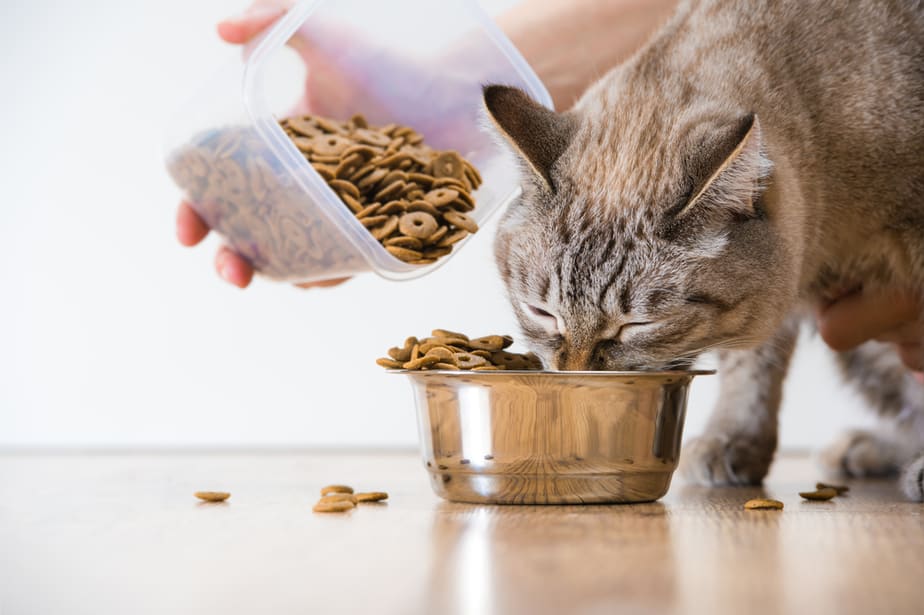
Right off the bat, there aren’t many reasons your cat should eat crackers. They’re calorically dense, packed with unfavorable ingredients, and don’t offer any nutritional or health benefits. You’re much better off treating your kitty to some healthier, cat-appropriate alternatives.
As mentioned before, an occasional cracker or two is unlikely to do any harm to your cat. These crunchy morsels do contain plenty of salt, fat, and cheese – but, tiny portions of these ingredients are pretty insignificant in the grand scheme of things.
If your precious pet leads a healthy lifestyle and thrives on animal-based meals, you shouldn’t be worried when she snatches a cracker from your plate. Make sure to monitor any changes in her behavior, and be on the lookout for early food poisoning symptoms.
You can always try making healthier crackers from scratch. Believe it or not, it’s not too difficult to make these delicious snacks cat-friendly. All you’ll need is some oat flour, olive oil, and water. This mixture will form a basic dough that you can shape and pop in the oven.
These homemade crackers might look a bit rustic and taste pretty bland, but they’ll provide your cat with some well-deserved crunch. Trust me, your feline friend will appreciate this labor of love! If all else fails, you can give up and share ONE Ritz cracker with her!
Can cats eat animal crackers?
Animal crackers, just like the name implies, are delicious cookies baked in the shape of an animal. They’re normally made with flour, sugar, corn syrup, and lots of oil. With these ingredients in mind, you might wonder whether your mischievous monster can enjoy this tasty treat.
Animal crackers aren’t toxic to cats, but… Just like with most human foods, they aren’t a healthy choice for your precious pet. An occasional treat won’t cause your cat any harm, but she might experience some digestive issues in the long run.
Sugar, corn syrup, and oil aren’t the way to go if you’re looking to preserve your cat’s gut health. High levels of sugar might lead to vomiting, diarrhea, and discomfort. If that isn’t enough, there’s a possibility your cat might get addicted to corn syrup and refuse to eat nutritious meals.
Excessive amounts of oil in animal crackers might become the leading cause of your cat’s weight issues. Trust me, you want to make sure she stays a healthy size because getting your cat to lose weight is a lost battle, not to mention her discomfort from the added pressure on her joints!
It’s safe to say you should rather avoid calorically dense foods.

Can cats eat cheese crackers?
We’ve already touched upon the issue with cheese crackers, but it doesn’t hurt to go over it again. Just like regular crackers, cheese crackers are packed with salt, fat, and calories. As if that wasn’t enough, someone decided to throw in a bunch of cheese!
Cats can eat cheese crackers, but… That doesn’t mean they should. While these savory snacks aren’t toxic to your precious pet, you should avoid them because they carry little to no nutritional value. As an obligate carnivore, your cat’s diet should consist of meat and animal-sourced vitamins and minerals.
You shouldn’t forget that most cats are lactose intolerant. While one cheesy cracker won’t cause them much harm, regular treats like this might lead to serious digestive issues in the long run. Your cat’s digestive system isn’t able to produce the enzymes necessary to break down milk and other dairy products.
So, to answer your question, cats can definitely eat a cheese cracker every now and then. Don’t make a habit out of it! If your furry friend’s a big fan of these savory snacks, you might want to look into making cheese crackers from scratch. Nutritional yeast will be your best friend!
Can cats eat rice crackers?
Rice isn’t toxic to cats, so feeding your cat with a couple of rice crackers every now and then shouldn’t be a big deal, right? Yes, but…
Rice crackers are normally made with refined white rice with very little fiber and protein. They have zero nutritional value for your cat!
While rice crackers shouldn’t cause any adverse reactions, there’s simply no good reason to include them in your cat’s diet. Your purrincess deserves gourmet delicacies made with heaps of fresh meat and delicious gravy (no, this isn’t your cat typing).
In addition to this, rice crackers are often made with additives and preservatives to give them a longer shelf life. Even though they have a reputation for being a healthy snack, they’re pretty much a poor choice for anyone. You AND your cat are better off munching on asparagus!

Can cats eat Graham crackers?
Graham crackers are normally made with graham flour (a type of coarse-ground whole wheat flour), honey, and cinnamon. These sweet treats are adored around the world regardless of their nutritional benefits, or the lack thereof.
They’re incredibly calorically dense, especially when paired with fluffy marshmallows and chocolate. It goes without saying that chocolate is toxic to cats and you should avoid feeding them anything that contains this delicious confection. But, are Graham crackers toxic to cats?
No, they’re not. That doesn’t mean you should start a fire and make s’mores with your trusty sidekick. While these sweet crackers aren’t toxic to cats, they shouldn’t be eaten in excessive amounts. You can’t disregard the fact that they’re packed with unfavorable ingredients.
Too much salt, sugar, or fat can lead to a variety of gastrointestinal diseases. Your cat might experience symptoms such as an upset stomach, vomiting, diarrhea, and discomfort. You should contact your vet and schedule a consultation before making any changes to her diet.
Not only that, a sugary diet can lead to feline obesity. Once your cat gains weight, it can be incredibly difficult to get her to eat restrictive meals. It’s safe to say, you should rather avoid feeding Graham crackers to your cat. Trust me, there are plenty of better alternatives!
How about crackers with salt?
Your boisterous beast loves the taste of fat and salt, the exact two ingredients that make saltine crackers so harmful to felines. If you’re wondering whether cats can eat crackers with salt, wonder no more. The answer to your question is NO.
As stated before, excessive amounts of sodium can be the cause of serious gastrointestinal diseases. Unfortunately for your cat, a single cracker with salt racks up an astounding 109 milligrams of salt.
If your cat eats too many crackers, she might experience severe dehydration. You should notice symptoms like excessive thirst, discomfort, lethargy, decreased appetite, and incoordination. If so, you should contact your vet and follow his advice to a tee.
Not only that, too much fat can lead to feline obesity, which is incredibly difficult to treat. Crackers with salt offer no nutritional benefits to you or your cat. Luckily, your precious pet already gets all her nutrients from her meat-based diet. Feel free to steer clear of crackers!
